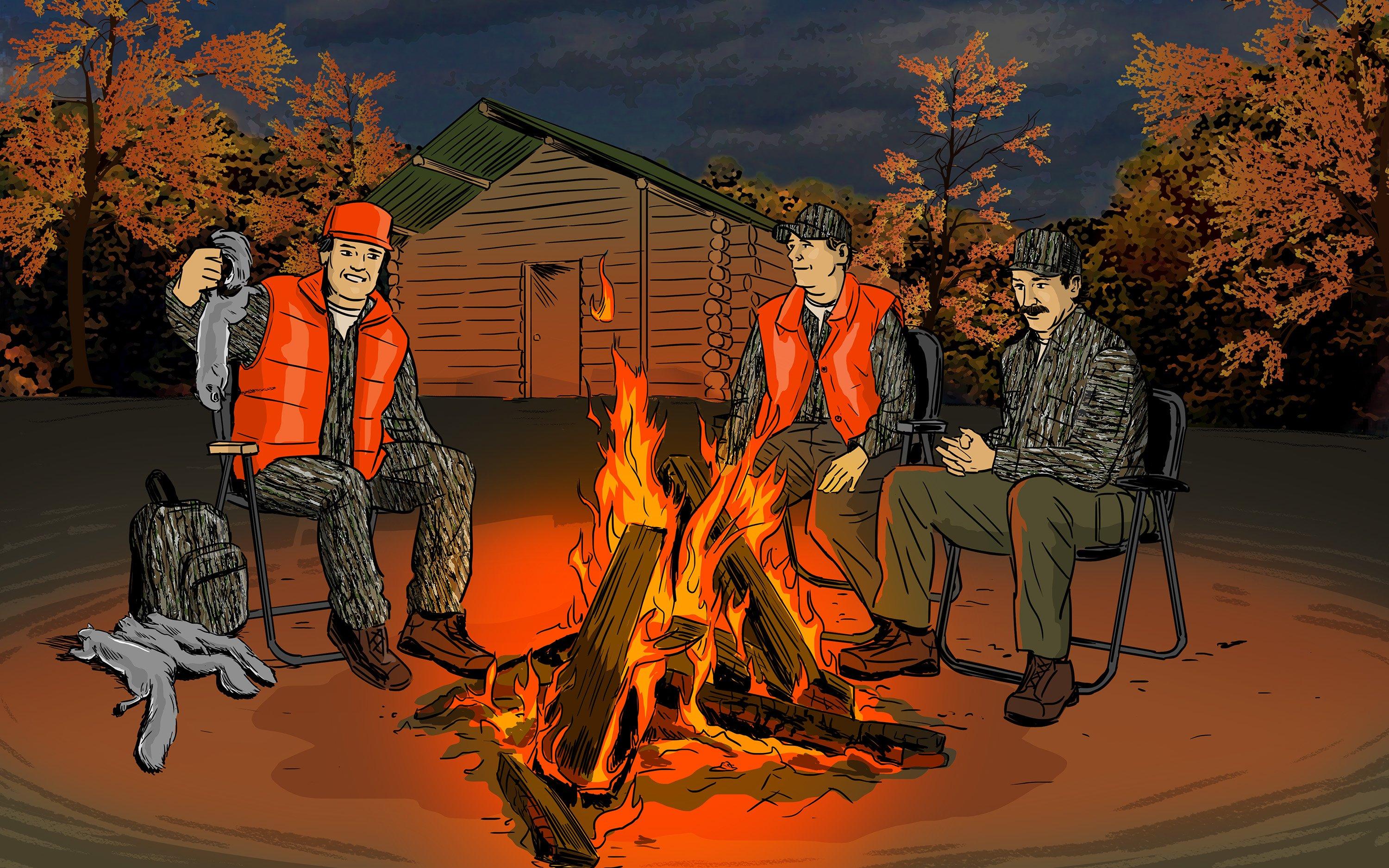Stories of the Mile 65 Hunting Club on the banks of the White River
There's deer camp. There's turkey camp. And, until a couple generations ago, there was squirrel camp.
These days, not so much. But it used to be big doings, this squirrel-camp business. Deer were scarce, turkeys even more so, but squirrels were abundant, and we were, after all, hunters. Sitting Bull said it best: When the buffalo are gone, we will hunt mice, for we are hunters and we want our freedom.
So we had squirrel camps. Some were pretty elaborate, too. Like ours. It started simply enough, as a weekend camping trip for my dad and me. I was about 13, so this would have been 1960, give or take a year.
To call it a bare-bones camp would be to overstate the case. We had a tent, two sleeping bags, an ice chest, a skillet and a tin coffeepot. No lantern, no chairs, no frills. Our provisions consisted of grease, potatoes, coffee, a dozen eggs, a loaf of bread, a package of bologna, and a sweet white onion the size of a cantaloupe. Dad liked his onions.
But our camp didn't stay simple. We enjoyed that weekend so much we invited a couple other people to go with us the next fall, and another two or three the next fall, and within a half-dozen years we had ourselves a full-blown squirrel camp; a bustling, complex tent city we'd keep operational for two full weeks. We named ourselves the Mile 65 Hunting Club, paid annual dues for food and other expenses, and spent the first half of each October on a bluff bank overlooking the river. The only way in and out was by boat, either 4 miles downstream from a primitive mud ramp or 11 miles upstream from an old ferry landing that wasn't much better. Just getting to camp was a chore, but even so, on opening day we always had at least 20 people. For the whole two weeks rarely were there fewer than half a dozen in camp.
The location was the lower White River bottoms of southeast Arkansas, a huge expanse of bottomland hardwoods 15 miles wide and more than a 100 long. It was the largest surviving remnant of William Faulkner's Big Woods: … bigger and older than any recorded document of white man fatuous enough to believe he had bought any fragment of it or Indian ruthless enough to pretend that any fragment of it had been his to convey.
Faulkner aside, this particular section of the Big Woods was owned then by Potlatch and now by you and me, as part of the White River National Wildlife Refuge. But then things were simpler, and laissez-faire prevailed: use it like you owned it, but leave it as you found it. We did both, with the minor exceptions of mowing down the poison ivy and scrub brush on our quarter-acre campsite, gathering up an immense pile of deadwood for the 24-hour campfire, and cutting a new willow ridgepole every year for the truck-tarp canopy that served as kitchen, social center and mess hall.
Speaking of campfires, ours were epic. We never kept track, but it wouldn't surprise me if we burned 10 cords of wood — cords, not ricks — during the two weeks. It was always blazing away, and during warm Octobers we had to sit far from the flames during the nightly bullfest and lie-swapping session. (You've heard it: Indian build little fire, sit up close; paleface build big fire, sit way back.)
I have Choctaw and Cherokee blood, but I'm big-fire all the way. So was everybody else in camp. Regardless of temperature or time of day, there was always somebody sitting around the fire, poking at it with a stick, or throwing on another armload of wood.
We all knew that under the right circumstances a feral hog could do you in, and they're so tough that if you killed one, all it would do is make him mad.
There were other squirrel camps scattered along the river, but none were close, and we laid claim to a big chunk of territory. As you'd expect in country this wild, there were beavers and otters, bobcats and turkeys and deer. The panthers were gone, but most years we'd see a bear or two.
There were also feral hogs, and they figured heavily into many of the campfire war stories. Most stories were funny and everyone laughed, but it was the nervous laughter of a night walker in the cemetery. Because we all knew that under the right circumstances a feral hog could do you in, and they're so tough that if you killed one, all it would do is make him mad.
I got mixed up with a sow and her piglets behind camp one day, and before it was all over I was wishing I was somewhere — anywhere — else. My dad once came face-to-face with a 400-pounder while crawling on his hands and knees through a canebrake, following what he had assumed was a well-worn deer trail. I thought that cane was too thick to run through, Dad said later. I was wrong.
And there was the time one of our group got chased up a honey-locust tree by an ill-tempered old boar with teeth out to here. Ned said he went up that tree like a starving possum after persimmons.
Whyn'cha shoot him?" I asked.
Couldn't. I ran away from my gun.
Whyn'cha climb something besides a thorn tree?
Nothin' else was close. I was in a hurry.
Didn't it hurt, going up through all those thorns?
Nah. It wasn't much fun coming back down, though.
Squirrel hunting was our excuse for being there, but the real purpose of the camp was the camp itself. Over the years, the means became the end, and though the hunting was important, it was also incidental. Most years we did pretty good with the squirrels, but we could have done as well (and done it cheaper) hunting closer to home and sleeping in our own beds at night. Our wives reminded us of this every year, but every year we packed up and went anyway. There were other squirrel camps scattered along the river, but none were close and we laid claim to a big chunk of territory.
Nothing lasts forever, though, and so it was with Mile 65 Hunting Club. Families, businesses, and life in general started getting in the way, and slowly we lost steam. The death blow came when Potlatch sold our land to the government and we had to abandon the campsite because it wasn't designated as such. Over the intervening years we've scattered to the winds, some of us dead, others crochety and crippled, still others moved far away. Today I live on the other end of White River, 350 miles upstream from the bluff bank where we used to camp.
But every October I make a pilgrimage. Sometimes I take somebody along, but usually I go alone. I launch at the old ferry landing, run 11 miles upriver in the half-light of the new morning, and tie off to a root or tree trunk at the base of that familiar bluff. Then I climb the bank, which seems to get higher and steeper every year, and step once again into the Big Woods.
I always start my hunt from the site of our old camp, and work my way back to a little lake we used to fish some afternoons. That's a 90-minute hunt, and then it's another 90 to hunt back to the campsite by a slightly different route. Always, I kill a few squirrels, some years more than others.
Before I descend the bluff to the boat, I sit for a while on an old cypress log that's been there since that first camp more than a half-century ago. It made a handy, comfortable bench seat for all the years of our squirrel camp, and it's no less comfortable today.
It's still a peaceful, remote place, and if I squint just right, I can see dad there on the other side of that big fire. If I'm quiet enough, I can still hear the echoes of the war stories.
And I can always smell the smoke.
Bonus read: 5 Reasons Squirrel Hunting Is So Popular
Follow Realtree on Facebook. Go here for more Realtree small game hunting.
[Editor's note: This Realtree.com post was first published Oct. 23, 2017.]








